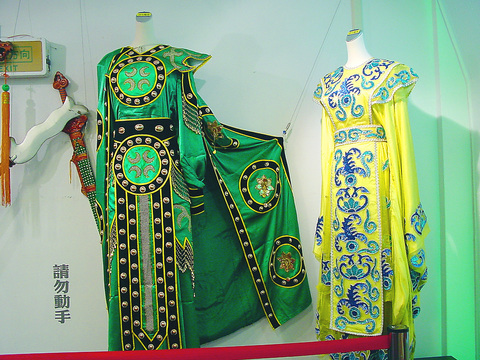For the first time in Taiwan's history, a nearly three-month-long festival devoted to the art of Taiwanese opera has been launched, last month at the National Center for Traditional Arts (國立傳統藝術中心), in Ilan County (宜蘭縣).
Sponsored by Uni-President Yi-Lan Art and Culture Corp (
The main purpose of the festival is to present the history of Taiwanese opera since its inception in Ilan in the early 1900s.

PHOTOS: DEREK LEE, TAIPEI TIMES
Opera started out as a means of outdoor entertainment for Taiwanese farmers and villagers and a way to worship gods on their birthdays. During the 1920s, the Japanese colonial government imposed strict restrictions on opera performances and forced the troupes to sing and act inside theater houses, so the the public could be controlled better.
Some of the well-known troupes were invited to perform in southern Fujianese cities, where people spoke the same Min-dialect.
From 1949 to 1956, when the Chinese Nationalist Party (KMT) took over control of Taiwan the number of registered Taiwanese Opera troupes was more than 500.

As radios, records and film impacted unfavorably on the opera business, the troupes learned to adapt and record their performances.
In the 1960s, however, the opera business was at a low and the number of opera troupes was reduced to about 100. This lasted until the 1970s when TV stations started to organize their own troupes and stage broadcasts of Taiwanese opera.
Many big-name stars such as Liao Qiong-zhi (
As to the content, there have also been changes. Previously, the stories were based on historical and folk legends. Nowadays, opera tries to address modern issues, such as national identity, judicial problems and bilateral relations between Taiwan and China.
Modern-content operas such as Taiwan, My Mother (2000) (台灣我的母親), A Case of a Court Judge (1991, 曲判記), Flower on the Other Side of the Bank (2001, 彼岸花), seem to have caught a new wave of popularity and have created another golden era for Taiwanese opera.

In the March 9 edition of the Taipei Times a piece by Ninon Godefroy ran with the headine “The quiet, gentle rhythm of Taiwan.” It started with the line “Taiwan is a small, humble place. There is no Eiffel Tower, no pyramids — no singular attraction that draws the world’s attention.” I laughed out loud at that. This was out of no disrespect for the author or the piece, which made some interesting analogies and good points about how both Din Tai Fung’s and Taiwan Semiconductor Manufacturing Co’s (TSMC, 台積電) meticulous attention to detail and quality are not quite up to

April 28 to May 4 During the Japanese colonial era, a city’s “first” high school typically served Japanese students, while Taiwanese attended the “second” high school. Only in Taichung was this reversed. That’s because when Taichung First High School opened its doors on May 1, 1915 to serve Taiwanese students who were previously barred from secondary education, it was the only high school in town. Former principal Hideo Azukisawa threatened to quit when the government in 1922 attempted to transfer the “first” designation to a new local high school for Japanese students, leading to this unusual situation. Prior to the Taichung First

Chinese Nationalist Party (KMT) Chairman Eric Chu (朱立倫) hatched a bold plan to charge forward and seize the initiative when he held a protest in front of the Taipei City Prosecutors’ Office. Though risky, because illegal, its success would help tackle at least six problems facing both himself and the KMT. What he did not see coming was Taipei Mayor Chiang Wan-an (將萬安) tripping him up out of the gate. In spite of Chu being the most consequential and successful KMT chairman since the early 2010s — arguably saving the party from financial ruin and restoring its electoral viability —

The Ministry of Education last month proposed a nationwide ban on mobile devices in schools, aiming to curb concerns over student phone addiction. Under the revised regulation, which will take effect in August, teachers and schools will be required to collect mobile devices — including phones, laptops and wearables devices — for safekeeping during school hours, unless they are being used for educational purposes. For Chang Fong-ching (張鳳琴), the ban will have a positive impact. “It’s a good move,” says the professor in the department of